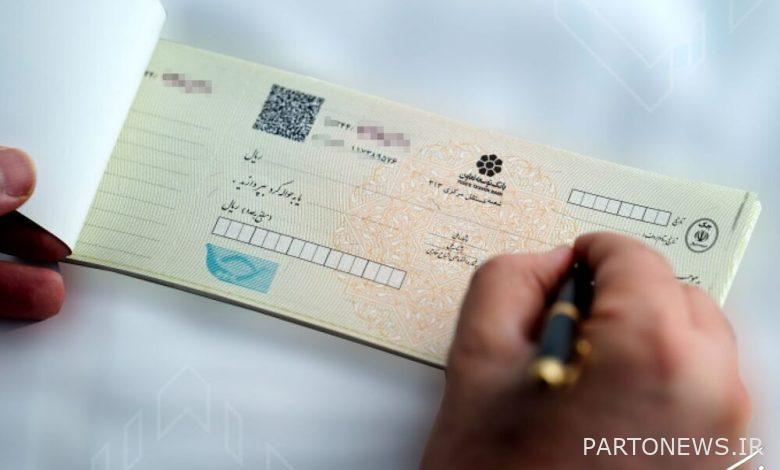Judicial prosecution of returned checks is an obstacle to the full effectiveness of the new check law

According to the Iran Economist, after the implementation of the new check law, statistics show a decrease in the ratio of the number and value of returned checks. However, there is still an issue that has hindered the full effectiveness of this law, and that is part of the new Czech law, which makes the pursuit of uncollected checks subject to a complicated and costly judicial process as in the past, and ultimately no guarantee of a check recipient. Unforeseen.
It was in 1997 that the Islamic Consultative Assembly passed a new law on checks, addressing the concerns of the people, especially economic activists, about issues related to checks, including uncertainty in receiving the amount of the check. In that year, the parliament took a big step towards greater transparency and stabilization of the country’s financial system by passing the “Law Amending the Check Issuance Law.” In this law, in short, the check issuer must register his check in the Sayad system (integrated electronic issuance of checks) and then provide it to the seller. After this, the recipient of the check can proceed with the acceptance of the check and the transaction by receiving the information of the records of the check issuer and ensuring that the issuer has no bad record in issuing unsecured checks. Also, if the check is returned, the check issuer’s account will be blocked according to the amount of the check issued. In addition, there are some legal penalties for the issuer of bad checks in order to prevent the issuance of bad checks.
During the implementation of the new check law, the statistics clearly show the decrease in the share of the number and value of returned checks from the total number of exchanged checks. As an example and according to the latest statistics of the Central Bank, more than 7 million checks worth about 2995 thousand billion rials were exchanged in March 1400 throughout the country. This month, the ratio of returned checks to exchange checks reached 8.9 percent, up from more than 15 percent before the new check law came into force. Also, according to Central Bank officials, currently 60% of the country’s check market is of the fishing type, which indicates the popularity of new checks and the public’s acceptance of this law.
Transparency of the financial system, reduction of risk in long-term financial transactions, online registration and issuance of checks are significant advantages of the new Czech law. However, one issue still hinders the full effectiveness of this law, and that is the judicial pursuit of returned checks and the impossibility of immediate collection of the check amount from other accounts of the check issuer. Article 9 of the law amending the law on issuing checks states:
The holder of the check can, by presenting a certificate of non-payment, request the competent court to issue an executive order against the deficit of the amount of the check and the attorney’s fee according to the legal tariff. The court is obliged to issue against the account holder, the issuer or both executives, if there are the following conditions.
A- In the text of the check, the receipt of the amount is not subject to the fulfillment of a condition;
B) It is not stated in the text of the check that the check is for guaranteeing a transaction or an obligation;
C- The non-payment certificate has not been issued due to the non-payment order according to Article (14) of this law and its notes;
The issuer is obliged to pay its debt within ten days from the date of notification of execution, or with the consent of the check holder, to arrange for its payment or to introduce a financial instrument that will enable the execution of the sentence; Otherwise, at the request of the holder, the execution of the judgments of the court shall be enforced in accordance with the “Law on the Execution of Financial Sentences approved on 23/3/1594” and the said sums shall be enforced.
If the issuer or his / her legal representative files lawsuits such as conditional or guaranteeing the check or obtaining the check through fraud or betrayal of trust or other crimes in the judicial authorities, filing a lawsuit will not prevent the execution of the enforcement action; Except in cases where the judicial authority has a strong suspicion or irreparable damage is caused by the implementation of the said document, in which case, after obtaining the appropriate security, the executive operation will be suspended. If the reason given is documented in an official document or if the issuer or the legal representative claims that the check was lost and the judicial authority finds the reasons presented acceptable, the execution will be suspended without obtaining security. These claims will be heard out of turn.
According to this part of the law, the process of receiving a returned check is almost unchanged, so that the recipient of the check has to go through a long and costly legal process to realize his right. Finally, there is no guarantee in law for the recipient of the check. This issue has left uncertainty in the market despite the implementation of the new check law, and therefore many economic actors are still concerned about the cash receipt of the check. Therefore, the parliament is expected to take the final step in stabilizing the country’s check market by amending this section of the law.

